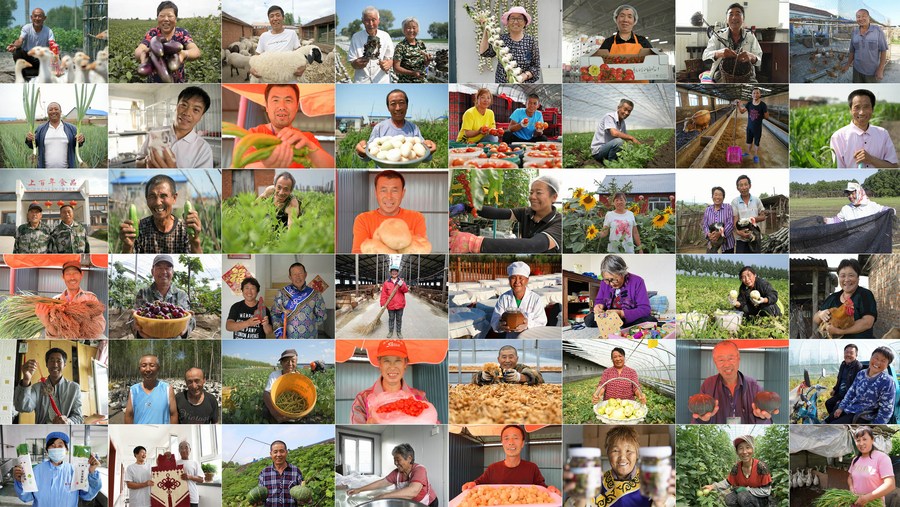China sets sail for modern future amid high hopes

Combo photo taken between July and October 2020 shows villagers, who used to be registered as impoverished households in over 20 cities and counties of northeast China's Heilongjiang Province, smiling as they have benefited from the businesses under poverty alleviation program. (Xinhua)
BEIJING, July 22 (Xinhua) -- China has achieved its first centenary goal of building a moderately prosperous society, or Xiaokang, in all respects. The country is forging ahead toward modernization amid expectations from home and abroad.
Last year, China's GDP exceeded 100 trillion yuan (about 15.42 trillion U.S. dollars), and its per capita disposable income hit 32,189 yuan. The country achieved the goal of doubling its 2010 GDP and per capita disposable income by 2020 as scheduled.
"Given where China was 40 years ago, that is a remarkable achievement," said Martin Raiser, World Bank's country director for China.
The World Bank uses per capita income as a summary measure of a country's overall level of development. Using this criterion, China is now an upper-middle-income country, and will soon be a high-income country, he said.
The world's largest developing country has achieved the complete eradication of extreme poverty, raising more than 770 million people out of poverty since its reform and opening up in the late 1970s, which accounts for more than 70 percent of the world's total.
"China's development progress to date and its targeted approach to poverty alleviation, which adapts to local conditions, has already offered valuable lessons for the global fight against poverty," said Beate Trankmann, resident representative of the United Nations Development Programme in China.
Trankmann also noted that Xiaokang and the United Nation's Sustainable Development Goals (SDGs) on eliminating poverty both emphasize the importance of ending poverty rather than just reducing it. "From this perspective, achieving Xiaokang society has significant meaning," she said.
XIAOKANG IN WIDER RANGE
Along with the country's development, the connotation of Xiaokang is extended beyond economic growth to multiple aspects, such as people's livelihood, culture, education, social security and environmental protection.
"By expanding the Xiaokang vision to cover the three dimensions of development, namely economic, social, and environmental, China's 21st-century development agenda aligns strongly with today's SDGs," said Trankmann.
Education, healthcare, social security and the quality of the environment are all important elements of a country's welfare, said Raiser. He stressed that "China has greatly improved access to as well as the quality of health and education services and expanded the coverage of social security."
Looking into China's future development, Raiser believes that equality of opportunities and access to services, as well as improvements in environmental protection and reductions in pollution, should play more important roles.
"Going forward, China's continued commitment to inclusive development that leaves no one behind will be vital to building and further expanding on the progress made, while also contributing to global efforts to achieve the SDGs", said Trankmann.
The demand of the elderly is high on the agenda of modernization, as China's aged population continues to increase.
"Faced with population-aging, China should fully mobilize senior citizens' enthusiasm in living and learning, and promote sustainable social development with the help of their experience and desire to participate in social development," according to international financial expert Ding Yu.
"Continued investment in the elderly and on healthcare is critical, as well as continued reform of the pension system, to ensure every senior is covered," said Trankmann.
MORE OPEN, GREENER FUTURE
In the eyes of many China watchers, continuous opening-up is an important hallmark of China's modernization.
In its development blueprint for the next five to 15 years, China has pledged to open wider to the outside world, promote trade and investment liberalization and facilitation, and steadily expand institutional opening-up in areas such as rules, regulations and standards.

Photo taken on Jan. 14, 2021 shows a night view of Lujiazui in Pudong of east China's Shanghai Municipality. (Xinhua/Fang Zhe)
"China can play an important role in supporting global growth and development, including through further opening-up of its domestic market," Raiser said.
Paolo Bazzoni, chairman of the China-Italy chamber of commerce, said that the Chinese market is probably "the number one market in the world." "You can not be a global leader without being present in China," he noted.
Thanks to the growing demand for quality products among Chinese consumers, especially the young generation, Italian enterprises have gained more business opportunities and are thriving in China, Bazzoni said.
China-Italy trade has been in good condition, Bazzoni said, expecting the trend to continue.
Low labor costs used to be one of China's strengths in international trade, said Bai Ming, a researcher from a research institute affiliated with China's Ministry of Commerce.
In the post-pandemic era, the country should foster new advantages in terms of quality, service, technology, branding and standard in international trade, he said.
In its 14th Five-year Plan, China did not set an explicit economic growth target and replaced it with a goal to keep its economy "running within an appropriate range."
Trankmann said this is a "promising" change. "This indicates that China is transitioning from years of fast, quantitative growth to higher quality, more sustainable growth, allowing more room for pursuing environmental goals," she noted.
In a bid to pursue high-quality and green growth, the world's second-largest economy has announced that it would strive to peak carbon dioxide emissions by 2030 and achieve carbon neutrality by 2060.
Trankmann expected China to play an important role in defining the "new normal" of the post-COVID-19 world as one that is low-carbon and environmentally friendly.
"In particular, China's commitment to making green investments will impact whether we can put the world on a low-carbon trajectory, which could have massive benefits for people as well as the planet," Trankmann said.
Photos
Related Stories
- Chinese premier stresses flood control, financial opening-up
- China to deepen financial opening-up, strengthen financial services for real economy
- China's "Xiaokang" in eyes of foreign students
- China issues guideline on high-level reform, opening-up of Shanghai's Pudong
- Xi leads China's final sprint to achieve milestone Xiaokang goal
Copyright © 2021 People's Daily Online. All Rights Reserved.










